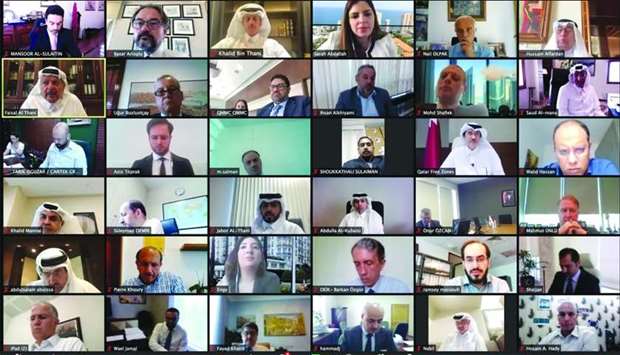The Qatari Businessmen Association (QBA) organised virtual specialised sectoral meetings on Wednesday, in co-ordination with the Foreign Economic Relations Association of Turkey (DEIK) as agreed during the last meeting of the Turkish-Qatari Joint Business Council held in April.
It was agreed to start the sectoral meetings with the health, medicine, and food industries sectors due to their “great economic importance,” especially in light of the health crisis.
More than 50 bilateral meetings were organised between Qatari companies and their Turkish counterparts, with the participation of Qatar Free Zones Authority (QFZA), QBA announced in a statement.
The meetings came as an activation of the memorandum of understanding (MoU) signed with QBA in February, which stated the provision of incentives and services to the local and foreign investors to enhance investment and support the economic development of the country.
QBA chairman HE Sheikh Faisal bin Qassim al-Thani headed the meeting, representing the Qatari side, in the presence and special participation of HE the Minister of State and Qatar Free Zones Authority (QFZA) chairman Ahmad bin Mohamed al-Sayed, as well as Mansour al-Sulaitin, consul general of the State of Qatar in Istanbul.
From the Turkish side, the meeting was chaired by Turkey-Qatar Business Council president Bashar Orglu and DEIK chairman Nael Olbak, in the presence of Mustafa Gokzo.
The meeting was also attended by QBA first deputy Hussain Alfardan, QBA second deputy Dr Sheikh Khalid bin Thani al-Thani, as well as QBA board members Saud al-Mana.
In attendance were QBA members Khaled al-Mannai, Nabil Abu Issa, Sheikh Faisal bin Fahad, Abdulsalam Abu Issa, Abdullah al-Kubaisi, Ihsan al-Khiyami, as well as QBA deputy general manager Sarah Abdallah.
Sheikh Faisal underscored the importance that the Qatari private sector is giving to the health, medicine, and food industries amid the Covid-19 pandemic, “as well as the efforts done through these meetings to build bridges of cooperation and benefit from the scientific and practical experiences of businessmen in both countries, with the aim of strengthening economic co-operation and opening new horizons and opportunities for businessmen and companies.”
He also thanked DEIK for helping organise the virtual event, which gathered around 40 Qatari companies from a total of 55 bilateral meetings to discuss specific co-operation and investment opportunities.
Sheikh Faisal reviewed the opportunities found in Qatar and the many incentives provided by the state to encourage investment, from advanced infrastructure and a favourable legislative structure and other facilities, to the existence of a free zone in Qatar with global standards.
He added that these factors, in addition to the experience of the Qatari companies with their international competitiveness, “are the drive which would qualify the two parties to launch successful projects and partnerships that are not limited to the common concept of import and export, but also to deeper and more important prospects, such as major investment and industrial projects.”
In his speech, al-Sayed discussed the quality of the infrastructure of Qatar Free Zones, which hosts some of the world’s leading companies like Google, Thales, DHL, and Microsoft.
He said, “The free zones have succeeded to establish a genuinely unique and integrated investment ecosystem as the free zones in Qatar will form an advanced platform to link Turkish products to global markets, especially Asian and South African, better than anywhere else in the region.”
Al-Sayed added: “We are particularly focused on strengthening key strategic industries and we are keen to bring in Turkish companies from the agri-tech and pharmaceutical sectors to work with our national partners so we may grow together.
“I would also like to point out that the bilateral agreements signed between the two brotherly countries will help facilitate the work of Turkish companies in all sectors in Qatar. The State of Qatar and the Turkish Republic are tied to a set of trade agreements that ensure smooth trade traffic between the two countries.”
Alfardan expressed the interest of Qatari businessmen in the Turkish market and the existing “great opportunities,” as well as the distinction of Turkish companies and the quality of their products regionally and globally. He stressed that the Qatari private sector has begun to invest in some areas in Turkey and has working groups exploring new opportunities.
Sheikh Khalid bin pointed out the importance of continuing to hold this series of specialised sectoral meetings between the private sector companies of both countries to include all vital economic like banking, construction and contracting.
In a speech, al-Sulaitin discussed the broad economic co-operation framework that Qatar is witnessing with the Turkish Republic, “with a constant aspiration to increase the pace of this cooperation and to raise the level of commercial relations between the two countries, so that it includes more sectors such as tourism, industry, health, and education.”
The rate of investment for Qatari businessmen in Turkey is approximately 70% prior to the Covid-19 pandemic, QBA said.

